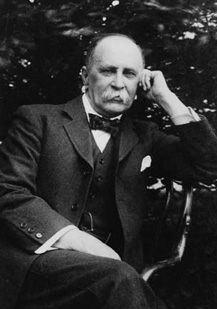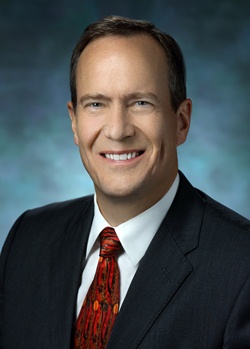 SIR WILLIAM OSLER, one of Hopkins’ four founding doctors, served as physician-in-chief and professor of medicine. He was a proponent of the close integration of the hospital with the instruction of students in the School of Medicine–a model emphasizing teaching at the bedside that he pioneered at Johns Hopkins. Through lectures and his landmark textbook, first issued in 1892, Principles and Practice of Medicine, he had a tremendous influence on both clinical practice and medical education in America. During the 14 years he spent at Hopkins, Dr. Osler revolutionized the medical curriculum of the United States and Canada, ushering in the era of scientific medicine and creating policies and programs that have endured. Dr. Osler was a skilled diagnostician, a generalist who believed physicians should be knowledgeable in a broad range of specialties. He did seminal work in hematology. He also published amusing and inspiring essays and speeches, still popular among physicians. Perhaps his most lasting legacy was his vision of how a physician ought to be: skillful and competent, yet approachable and compassionate.
SIR WILLIAM OSLER, one of Hopkins’ four founding doctors, served as physician-in-chief and professor of medicine. He was a proponent of the close integration of the hospital with the instruction of students in the School of Medicine–a model emphasizing teaching at the bedside that he pioneered at Johns Hopkins. Through lectures and his landmark textbook, first issued in 1892, Principles and Practice of Medicine, he had a tremendous influence on both clinical practice and medical education in America. During the 14 years he spent at Hopkins, Dr. Osler revolutionized the medical curriculum of the United States and Canada, ushering in the era of scientific medicine and creating policies and programs that have endured. Dr. Osler was a skilled diagnostician, a generalist who believed physicians should be knowledgeable in a broad range of specialties. He did seminal work in hematology. He also published amusing and inspiring essays and speeches, still popular among physicians. Perhaps his most lasting legacy was his vision of how a physician ought to be: skillful and competent, yet approachable and compassionate.
William Osler Professorship in Medicine
School of Medicine
Established in 1978 by the estate of J. Earl Moore in memory of William Osler
Held by Mark Anderson
 Dr. MARK ANDERSON assumed the position of the William Osler Professor of Medicine, Director for the Department of Medicine at the Johns Hopkins University School of Medicine in August 2014.
Dr. MARK ANDERSON assumed the position of the William Osler Professor of Medicine, Director for the Department of Medicine at the Johns Hopkins University School of Medicine in August 2014.
Prior to joining The Johns Hopkins University, Dr. Anderson was the Francois M. Abboud Chair of Internal Medicine and the Chairman and Department Executive Officer for the Department of Internal Medicine at the University of Iowa from 2009 – 2014. He served as Director of Cardiovascular Medicine prior to taking the role of Chair. During his tenure at Iowa, he served as Director of the Francois M. Abboud Cardiovascular Research Center which seeks to develop multi-disciplinary cardiovascular research to attract industry, business, and government partners as the typical channels for funding biomedical research decline. Before Iowa, Dr. Anderson was at Vanderbilt University where he served in multiple capacities, including Director of the Electro-physiology and Cardiovascular Research Fellowship Programs and Arrhythmia Service, as well as serving as a member of the Vanderbilt Physician Scientist Development Program selection committee.
He received his undergraduate degree in biology from Macalester College in St. Paul, Minnesota and his MD and PhD in Physiology from the University of Minnesota. He completed his internal medicine residency and fellowships in cardiology and clinical cardiac electrophysiology at Stanford University.
Dr. Anderson’s research is focused on cellular signaling and ionic mechanisms that cause heart failure and sudden cardiac death. He is widely recognized as an international expert in defining the role of calmodulin kinase II (CaMKII) regulation in heart failure and arrhythmias. The laboratory is funded by the National Institutes of Health, the American Heart Association, the American Asthma Foundation, and the Fondation Leducq. Dr. Anderson has published nearly 200 peer-reviewed publications and is frequently an invited speaker nationally and internationally to present his research. He is a cofounder of Allosteros Therapeutics, a biotech aiming to develop CaMKII inhibitor drugs. Dr. Anderson is an elected member of the American Society for Clinical Investigation, the Association of American Physicians, and the American Clinical and Climatological Association in recognition for his accomplishments as a physician-scientist and leader in the discovery of medical knowledge. He serves on numerous editorial boards and professional organizations, including the Journal for Clinical Investigation, Circulation, Circulation Research, and the Journal of Molecular and Cellular Cardiology.